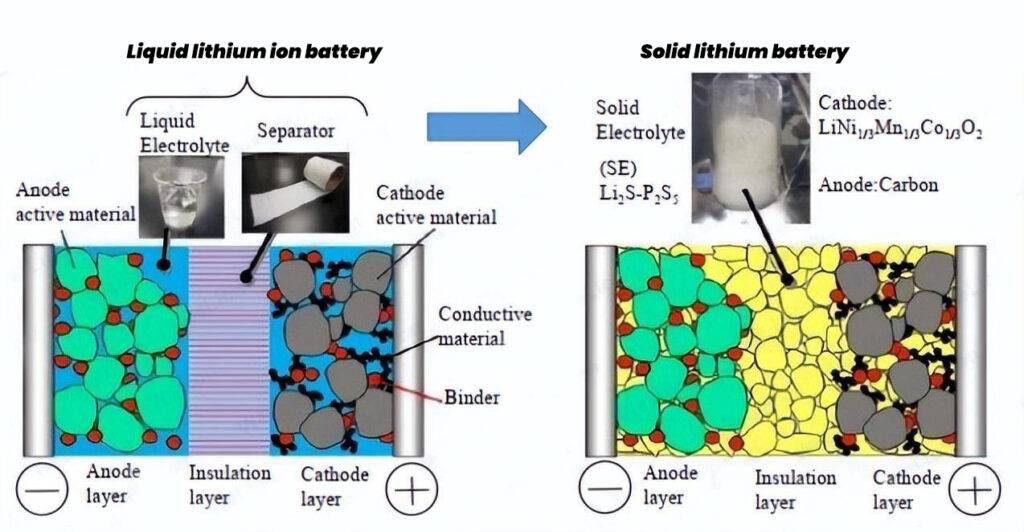Electric vehicles (EVs) are set to revolutionize transportation, with solid-state batteries offering significant advantages over traditional lithium-ion technology, while advanced software enhances performance and user experience. This article explores how these innovations will shape the future of EVs.
How Do Solid-State Batteries Work?
Solid-state batteries utilize a solid electrolyte instead of a liquid one found in conventional lithium-ion batteries. This solid electrolyte can be made from various materials, including ceramics or polymers, which allows for higher energy densities and improved safety due to reduced flammability risks.
Chart: Comparison of Battery Types
| Feature | Lithium-Ion | Solid-State |
|---|---|---|
| Electrolyte Type | Liquid | Solid |
| Energy Density | Lower | Higher |
| Safety | Moderate risk of fire | Lower risk |
| Cycle Life | Limited | Potentially longer |
What Are the Advantages of Solid-State Batteries for Electric Vehicles?
Solid-state batteries present several key advantages for electric vehicles:
- Higher Energy Density: They can store more energy in a smaller volume, leading to longer driving ranges.
- Improved Safety: The solid electrolyte is less likely to catch fire compared to liquid electrolytes.
- Longer Lifespan: These batteries can endure more charge-discharge cycles, extending their life.
- Faster Charging: They can potentially support quicker charging times due to their design.
Chart: Benefits of Solid-State Batteries
| Advantage | Description |
|---|---|
| Energy Density | Higher storage capacity |
| Safety | Reduced flammability |
| Cycle Life | More charge cycles before degradation |
| Charging Speed | Quicker recharge times |

What Challenges Must Be Overcome for Solid-State Battery Adoption?
Despite their advantages, several challenges hinder the widespread adoption of solid-state batteries:
- Manufacturing Costs: The production process is currently expensive and complex.
- Material Limitations: Finding suitable materials that can conduct ions effectively remains a challenge.
- Scalability: Scaling up production while maintaining quality is difficult.
Addressing these challenges will require significant investment in research and development.
How Does Software Enhance Electric Vehicle Performance?
Software plays a critical role in optimizing electric vehicle performance through:
- Battery Management Systems (BMS): These systems monitor battery health and optimize charging cycles to extend battery life.
- Vehicle Dynamics Control: Software algorithms enhance vehicle handling and stability by adjusting power distribution among wheels.
- User Interfaces: Advanced software provides drivers with real-time data on battery status, range, and charging options.
What Is the Integration of Solid-State Batteries and Software?
The integration of solid-state batteries with advanced software solutions promises to unlock new capabilities for electric vehicles:
- Smart Charging Solutions: Software can optimize charging times based on energy costs and grid demand.
- Predictive Maintenance: Advanced analytics can predict battery failures before they occur, reducing downtime.
- Enhanced User Experience: Real-time updates on battery status and vehicle performance improve user engagement.
What Are the Future Trends in Electric Vehicle Technology?
The future of electric vehicles will likely be shaped by several trends:
- Increased Adoption of Solid-State Batteries: As manufacturing processes improve, these batteries will become more common in EVs.
- Greater Software Integration: Enhanced connectivity will allow for better vehicle-to-grid communication and smart charging solutions.
- Sustainability Focus: The industry will continue to prioritize environmentally friendly materials and recycling methods.
Industrial News
Recent developments indicate a surge in investment towards solid-state battery technology. Major automotive manufacturers are collaborating with tech companies to accelerate research into efficient production methods. Additionally, regulatory bodies are pushing for standards that ensure safety and performance in emerging battery technologies, highlighting a commitment to advancing electric mobility.
Redway Expert Insights
“Solid-state batteries represent a paradigm shift in energy storage for electric vehicles,” says Dr. Jane Redway, an expert in battery technology. “Their potential to enhance safety while improving energy density could redefine how we think about EV ranges and charging times.”
FAQ Section
Q1: What are solid-state batteries?
A1: Solid-state batteries use a solid electrolyte instead of a liquid one, offering higher energy density and improved safety.Q2: Why are solid-state batteries safer than lithium-ion?
A2: They reduce the risk of fire due to their non-flammable solid electrolytes compared to liquid electrolytes used in lithium-ion batteries.Q3: What challenges do solid-state batteries face?
A3: Key challenges include high manufacturing costs, material limitations, and scalability issues.Q4: How does software improve electric vehicle efficiency?
A4: Software enhances efficiency through battery management systems, predictive maintenance, and optimizing vehicle dynamics.Q5: What future trends should we expect in electric vehicles?
A5: Expect increased adoption of solid-state batteries, greater software integration, and a focus on sustainability within the industry.



